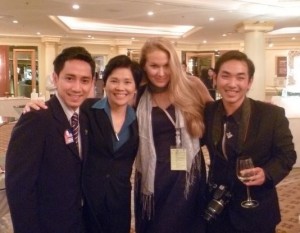
I walked into the office to do my kindest “wai” by folding my hands together and gracefully bowing my head. In the Thai countryside, wai-ing all your colleagues is a way to show respect. Initially, I bowed my head so much, I almost got whiplash; having no idea whom to show honor to, I did it to everyone. Only later did I learn that this is done only to senior colleagues and those older than you.
When you’re an expat working abroad, you quickly come to terms with the fact that office culture in the U.S doesn’t always translate over to your new host country. I’ve spent time as a Fulbright scholar researching in Chiang Mai and later working a fast-paced job in Bangkok. While I’m now back in the States, I still carry with me some powerful career lessons from my time in Thailand that can lead to success anywhere. Here’s what I learned.
1. Learn to Decode Body Language
Thailand is known for its people’s gentle smiles. This can be endearing to the traveler just passing through; however, in daily life and in the office, a smile can mean many things. It is said that there are over 30 different types of Thai smile, which can express sentiments from “I don’t agree with what you are saying” or “I really like your project” to “I’m embarrassed” or “I don’t know.”
I doubt I will ever fully understand what lies behind each smile, but trying to learn has helped me to be mindful that, when you’re working with someone from another culture, you can’t always take his or her actions and customs at face value. I’ve learned to slow down, dig deeper, and try to understanding where others are coming from in our interaction, using a variety of cues.
(For the record, I’ve also learned that it definitely doesn’t hurt to smile often! It reduces tension, creates more positive thinking, and offers hope.)
2. Don’t Lose “Face”
In the United States, it’s not uncommon for people to call others out when they make a mistake—think: you’re giving a work presentation, and a know-it-all in the audience tries to embarrass you during the Q&A. In these embarrassing moments, many of us blush, some of us run out of the room, and others apologize.
But in Thailand, “face” is everything—people are very careful about not shaming or embarrassing anyone. They tend to keep cool, even in tense situations. This, I think, is something U.S. workplaces could definitely benefit from. If someone is wrong, or even if they’re really upsetting you, don’t blow up in anger right away or make them feel silly or stupid. When you stay calm, everyone keeps face and wins.
3. Respect Your Elders
At a dinner reception in Thailand, you’re piling spring rolls on your plate when a senior director from the company strikes up a conversation. You might be famished, but etiquette says that you put down your plate, listen, and learn—every single time. This rule applies to those even slightly older than you. (If you’re close, you can refer to the person as “pi,” older brother or sister.)
In the U.S., it’s common for younger generations to be dismissive of elders and not always respectful. But I love this tradition in Thailand. No matter where you are, those more experienced than you could turn out to be your future mentor—or employer. Show respect, and be open to the wisdom they have to share. It’s worth the listen.
4. Know That it Will Get Done
 When I started working in Thailand, I was still in a New York mindset: I expected everything to have been done yesterday. But I quickly realized I was the only one stressing about deadlines—doing things as fast as possible simply isn’t the priority. Instead, accomplishing tasks often required sharing a lot of meals, smiling a lot, and having faith that with gentle follow up, the important deadlines would be met.
When I started working in Thailand, I was still in a New York mindset: I expected everything to have been done yesterday. But I quickly realized I was the only one stressing about deadlines—doing things as fast as possible simply isn’t the priority. Instead, accomplishing tasks often required sharing a lot of meals, smiling a lot, and having faith that with gentle follow up, the important deadlines would be met.
And usually, they were. Even if it wasn’t on my schedule, things would get done. So now that I’m back in the U.S., this is an important reminder—not to forget about deadlines, but that sometimes things just aren’t going to get done on your own personal time frame.
5. Everything is M’pen Rai
In Thailand, there’s a popular saying, "m’pen rai," which means “no worries” or “never mind.” It can also express forgiveness, or “it’s OK.” You might think this attitude would create challenges in a professional setting, but in fact, it sets everyone on an equal playing field and even acts as a magic wand of understanding.
Now that I’m back, I often think “m’pen rai,” especially if a situation is getting tense. Life is too short to stay worked up about things I won't even remember a year from now. This simple saying fosters clarity, focus, and a feeling of inclusiveness—and reminds me not to sweat the small stuff.
6. Be Genuine, Stay True to Yourself
Faced with different cultural expectations and standards, I often had to determine for myself what I was okay with—and when I would take a stand. I put my heart into what I did and spoke gently but honestly if a situation arose that required confrontation. Even if I knew others weren’t inclined to agree with me, I found that by being honest with myself, really listening to others, and offering my ideas (even if they got lost in translation) gave me strength and confidence while navigating work in a new culture.
It wasn’t always easy to work and find success in another culture, but I’m forever grateful for the experience. Working abroad taught me a lot about my own strength, stamina, and the importance of staying positive and calm, even in the most stressful of workplace situations. Only now am I seeing the importance of what I learned take shape in the American workplace and finding success based on my experiences abroad.